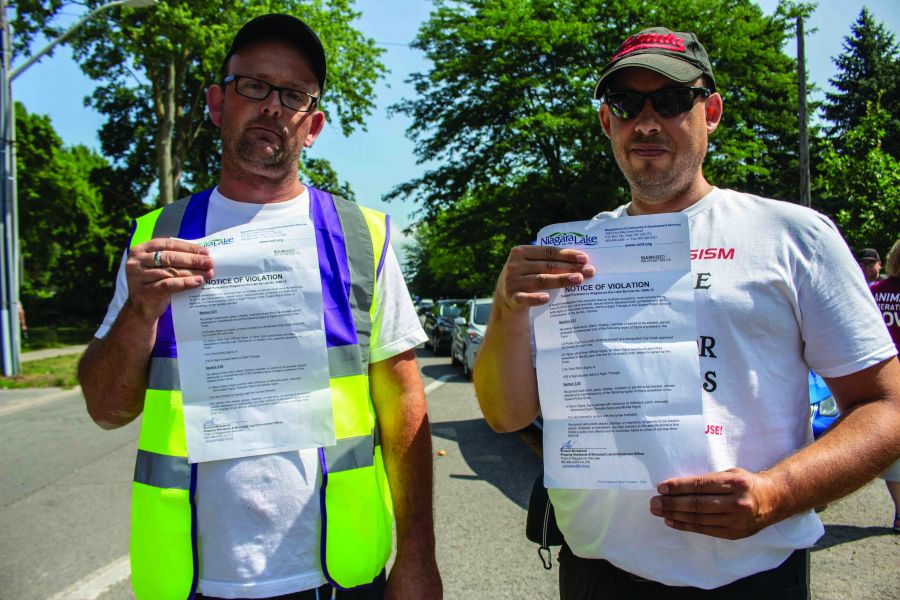Adam Stirr, the founder of At War For Animals Niagara says a Town of Niagara-on-the-Lake bylaw officer violated his Charter rights when she sent him a notice of violation in July.
The notice, also sent to two other members of AWFAN — a local animal rights activist group that’s been protesting the use of horse-drawn carriages in Niagara-on-the-Lake — warns they were observed on “multiple occasions” violating the Town’s sign bylaw (4586-12).
“You are directed to comply with the bylaw forthwith,” the letter states, warning if they do not, each person risks getting a $350 fine.
The letter is signed by a property standards and municipal law enforcement officer for the Town of NOTL.
Stirr said after reading through the bylaw, he doesn’t believe it is intended to apply to people who are exercising their rights to protest.
He said from his understanding, the Town’s sign bylaw is intended to apply to businesses, in order to preserve the heritage nature of the town’s commercial district.
“It’s not looking good on the Town as a whole,” Stirr said.
NOTL’s chief administrative officer Holly Dowd said the bylaw officer, Victoria Wickabrod, was only enforcing a bylaw approved more than a decade ago by council.
“If (bylaw officers) see there’s a contravention of a bylaw … then they act accordingly under our bylaws,” Dowd said.
Dowd said there was no Town direction given to Wickabrod to send the notice, and that bylaw officers don’t have specific oversight, though she and the Town’s director of community and development services Craig Larmour believe the notice was an appropriate action to take if the officer thought a bylaw was being violated.
“If there was an issue, she might have to go back to a supervisor before she would act, but in this case she’s just following what her job is,” said Dowd.
Both she and Larmour said the Town could not answer whether or not the bylaw is intended for people protesting under the Canadian Charter of Rights and Freedoms, because the bylaw doesn’t specifically cover the subject.
“We don’t have a legal opinion on this, and we’re not offering one now on whether our bylaw is compliant with the federal Charter of Rights and Freedoms,” Larmour said.
“If there’s a conflict between the Charter of Rights and any municipal bylaw, then the challenge can be brought, and it can considered at that time — whether it’s through the courts or it’s brought up in the defence of a prosecution,” he said.
In this case there was no prosecution, he noted.
“This was just a warning of violation of the municipal bylaw.”
“The Town would never pass a bylaw that was knowingly contravening federal legislation,” Larmour said.
Dowd said the town would need a legal opinion in order to talk further about whether the bylaw is unlawful, though staff likely would not seek advice unless doing so is recommended by council.
After clarifying twice, Dowd and Larmour said their position is that the action taken by the bylaw officer was appropriate in this case.
“We’re following our bylaws that council has approved,” Dowd said.
Stirr said he believes the bylaw was not used as it was intended.
“This is egregious,” he said.
Stirr also claims Wickabrod is a “known associate and friend” of one of the owners of Sentineal Carriages — “which we happen to be protesting,” he added, noting she attended (off-duty) a protest in July in support of Sentineal Carriages.
Stirr said according to his research there have been bylaws to govern protests in the past, but those were for safety issues — not based on bylaws intended for businesses.
“There are instances where bylaws have been passed by municipalities to create safe spaces for example around … protests that are violent, unruly and there’s a legitimate safety risk,” Stirr said. “And that is acceptable under the Charter if there is a good reason to limit protest.”
Stirr said he questions the motives behind the notice, though he doesn’t think Town staff or Lord Mayor Pat Darte played a role.
“The mayor understands our right to protest,” Stirr said.
Darte said he has contacted MP Rob Nicholson to ask for some clarification about the Charter of Rights, but the answer “is not cut and dried.”
The Town has to look at its municipal bylaw in relation to federal policy, he said, and that will require a legal opinion.
“If one side or the other doesn't like it, ultimately they will take it to court.”
The opinion that matters, he added, is that of the judge.
– with files from Penny Coles.











